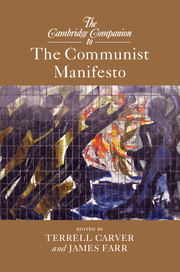Book contents
- The Cambridge Companion toThe Communist Manifesto
- Cambridge Companions to Philosophy
- The Cambridge Companion toThe Communist Manifesto
- Copyright page
- Contents
- Figures
- Notes on the Editors and Contributors
- Book part
- Glossary
- Editors’ Introduction
- Part I Political and Biographical Context
- Part II Political Reception
- Part III Intellectual Legacy
- Part IV The Text in English Translation
- Notes
- Index
- References
Part II - Political Reception
Published online by Cambridge University Press: 05 September 2015
- The Cambridge Companion toThe Communist Manifesto
- Cambridge Companions to Philosophy
- The Cambridge Companion toThe Communist Manifesto
- Copyright page
- Contents
- Figures
- Notes on the Editors and Contributors
- Book part
- Glossary
- Editors’ Introduction
- Part I Political and Biographical Context
- Part II Political Reception
- Part III Intellectual Legacy
- Part IV The Text in English Translation
- Notes
- Index
- References
Summary

- Type
- Chapter
- Information
- The Cambridge Companion to The Communist Manifesto , pp. 85 - 152Publisher: Cambridge University PressPrint publication year: 2015



